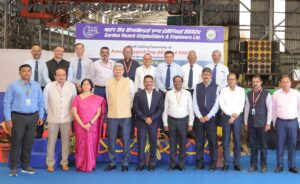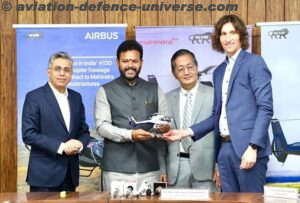New Delhi. 03 April 2025. The second day of Startup Mahakumbh 2025 continued to build strong momentum with the spotlight on the Defence, Space & B2B, Precision Manufacturing Pavilion — a dynamic showcase of India’s deep-tech and strategic innovation. As the global community increasingly looks toward India for next-generation solutions in aerospace, defence technologies, B2B, and precision manufacturing, this pavilion emerged as a catalyst for critical collaborations between startups, government bodies, industry leaders, and investors.
During the keynote at B2B, Precision Manufacturing, defence and Spacetech pavilion at Startup Mahakumbh, Amit Satija, IAS, Joint Secretary, Department of Defence Production, Ministry of Defence, Government of India said, “The iDEX (Innovations for Defence Excellence) is pioneering initiatives to drive India’s defence ecosystem initiated by Ministry of Defence. It aims to nurture innovation and technology development in aerospace and defence through collaboration with startups, MSMEs, individual innovators, and academia. So far, iDEX has collaborated with around thousands of startups or more than 450 projects also under the initiative of iDEX investor hubs, INR 445 crore has been invested in iDEX winners, reflecting the confidence of investors in iDEX-based innovations. The startups will drive Viksit Bharat, a tech-savvy, self-reliant, and globally innovative India; and strengthening deep tech entrepreneurship, R&D, and indigenous solutions will transform our defence industry, in the top global exporters. I am happy to say that we have again crossed the boundary last year’s defence export was INR 21,000 crore. Now this year we have reached around INR 23,600 crore. So with your help, this boundary is getting crossed every year and we wish to export INR 50,000 crore by 2028/29. So let this Startup Mahakumbh be the birthplace of game-changing ideas that shape our nation’s security and prosperity.”
In a development that aims to facilitate technical knowledge sharing, expert support, and overall facilitation to advance space activities in India, the Indian National Space Promotion and Authorization Center (IN-SPACe) announced the signing of the MoU with the Defence Technology Development Fund (DTDF) and the Directorate of Research and Development (DROD) to support Startups and MSMEs under the Dare to Dream contest and the Technology Development Fund (TDF) scheme for Defence Space Technologies.
Further, a dedicated panel themed “Innovations in precision manufacturing” on trade and policy addressed the barriers and opportunities in India’s space sector, anchored by Jagathi Priya, Deputy Director, Program Management and Authorisation at IN-SPACe, the panel included industry leaders including Ashok G.V. (Partner, Factum Law & Allied Law Practices), Bhuvnesh Pratap Singh, IAS (Deputy Secretary, DPIIT, Ministry of Commerce and Industry, Government of India), Dr. Kumar Abhijeet (Legal Officer, Ministry of External Affairs), and Girindra Pratap Singh, IRS (Glomo), outlined India’s commitment to international space treaties while aiming for agile regulation to support startup growth. With 100% FDI now allowed in several sectors, and India targeting a $44 billion space economy within a decade, the momentum is strong. Speakers emphasized the importance of export control awareness, faster government approvals, and robust internal compliance systems within startups.
Additionally, the panel around Innovations in precision manufacturing, moderated by Abhishek Chandra (Partner, Evolvence India Fund), brought together eminent voices from India’s deep-tech and manufacturing startup ecosystem. The panel featured Gurushankara K C (Chief Executive Officer and Co-founder, Dheya Technologies), Rajanikanth Balaraman (Co-founder, Chief Technology and Growth Officer, Unimech Aerospace), and Smriti Sakhamuri (Executive Director, Hind High Vacuum (HHV) Advanced Technologies). The discussion focused on advancements in deep-tech, the role of innovation in scaling startups, and the challenges in building sustainable technology ventures. Panellists emphasized the need for strong industry collaboration, long-term investment, and policy support to drive growth in India’s evolving startup ecosystem.
Lastly, the panel on – Bridging the Innovation Gap: Strengthening Collaboration with Startup – Industry – Academia for Development of Critical and Deep Tech Technology – moderated by Manish Kumar Jha (Host, Sansad TV) and the session was chaired by Dr. Subrata Rakshit (Retd.) (Distinguished Scientist and Director General, Technology Management (TM), DRDO) along with fellow panellists, including Brig. Adarsh Bhardwaj (Executive Director, Azista BST Aerospace Pvt. Ltd.), Col. Krishna Deepak (HQ IDS (FT)), G S Narayan (Tejase Aerosense), Nidhi Bansal (Director, Technology Development Fund), and Tanveer Ahmed (Co-founder and CTO, Digantara). The session highlighted the government’s role in accelerating startup growth, the critical shift towards deep-tech ventures, and the necessity of a strong academic ecosystem. Moreover, it emphasized policy support, financial backing, and fostering young entrepreneurs without financial burdens emerged as key drivers of growth. Unlike consumer startups, defence and space ventures demand specialized knowledge and sustained investment. The discussion reinforced the strategic importance of deep-tech startups in strengthening India’s self-reliance in defence and aerospace.
From the keynote addresses to deep-dive panel discussions and tech showcases, Day 2 of Startup Mahakumbh 2025 reaffirmed India’s commitment to becoming a powerhouse in deep-tech, defence, and strategic enterprise manufacturing. With bold vision and collaborative action, the event paved the way for startups to not only solve national challenges but also emerge as global champions of innovation.

































































































































